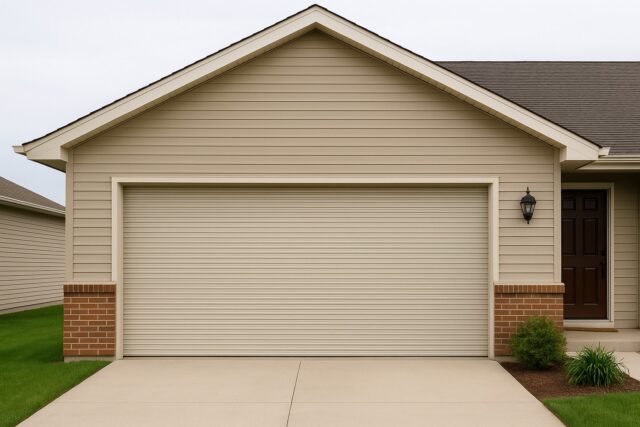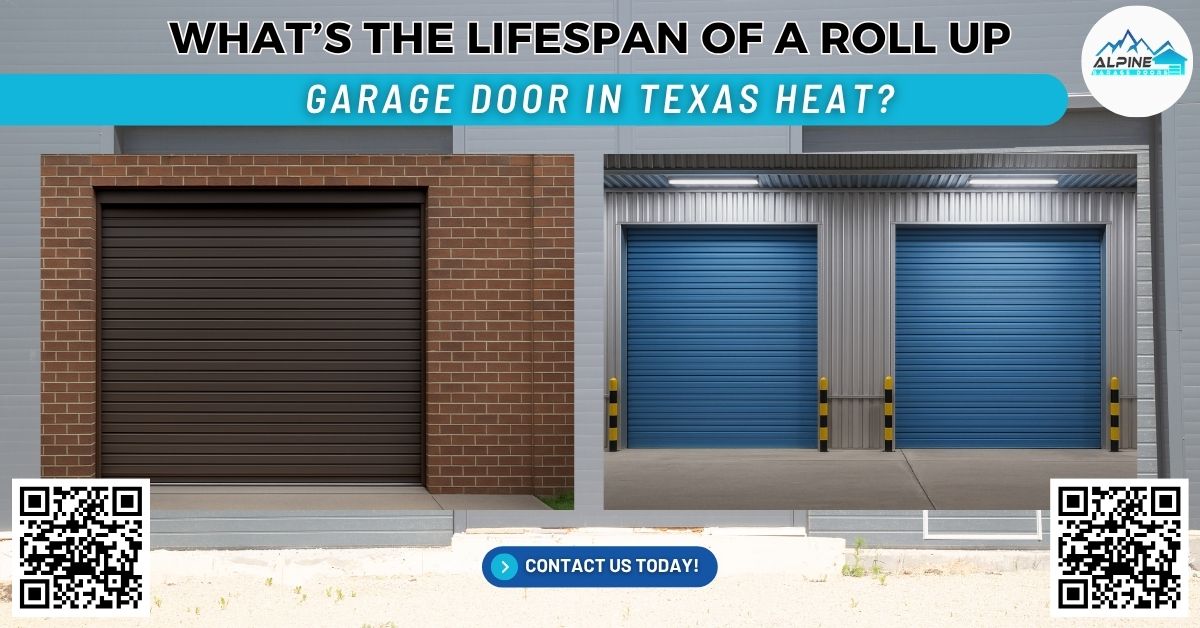Imagine coming home one hot August afternoon to find your roll-up garage door stuck halfway open again. That’s what happened to one of our residential customers in Atascocita. Their steel roll-up door, installed over a decade ago without insulation or a proper maintenance plan, was buckling under the intense Texas sun. After evaluating the door model, the structural design, and the wind load rating, our technicians confirmed what we see far too often in Texas: extreme heat accelerates garage door wear and shortens its lifespan.
According to construction industry data and manufacturers like Janus and Amarr, the average lifespan of a rolling sheet door drops significantly in hot, humid environments without the right features like durable polyester paint finishes, insulation, and chain hoists for smooth operation. While roll-up doors are designed for heavy-duty use, not all are built to handle Texas heat, wind loads, and daily wear in both residential and commercial applications.
So, what’s the real-life expectancy of a roll-up garage door in our climate? Let’s walk you through the key factors, materials, installation standards, and maintenance routines to ensure your garage door model survives the Texas sun for years to come.
What Is a Roll-Up Garage Door?
A roll-up garage door is a practical, space-saving solution used in both residential garages and commercial field applications. Instead of swinging out like traditional doors, roll-up doors are made of slats or sheets of steel or aluminum that coil into a drum above the opening. This operation style provides maximum vertical clearance and is ideal for tight site spaces, warehouses, and masonry sheds.

There are two primary types of roll-up garage doors:
- Rolling Sheet Doors – Made from a single sheet of steel, typically used in light-duty settings such as storage sheds and small warehouses.
- Slat Doors – Composed of individual slats for enhanced durability, often used in commercial and industrial installations.
Modern roll-up door models also come with special features like insulated panels, cam-action locking mechanisms, and certified wind load ratings, which are crucial for meeting stringent building codes such as the International Building Code (IBC) or Florida Building Code (FBC).
Average Lifespan of Roll-Up Garage Doors in Texas
Under normal conditions, a steel roll-up garage door can last 15–30 years. However, in Texas, where summer temperatures often exceed 100°F, and structures must withstand high wind load conditions, the lifespan can shrink to 10–20 years or even less without proper care.
Several factors influence this:
1. Material Composition
Roll-up doors come in a wide range of materials, with galvanized steel being the most common due to its durability. Other options include aluminum (lighter but less impact-resistant) and fiberglass (UV-resistant but costly).
- Heavy-duty steel doors are more resistant to impact and heat.
- Light-duty models are more affordable but degrade faster under pressure from weather and daily operation.
2. Climate Conditions
Texas brings a tough mix of heat, humidity, wind, and UV radiation, all of which deteriorate coatings and expand metal. Without durable polyester paint and rust-resistant coatings, doors may warp, peel, or lose their color and structural strength.
3. Usage Frequency
The more a door is opened and closed, the quicker its components wear out. Frequent operation without a chain hoist or automated system increases stress on the track, latch system, and torsion springs.
4. Installation and Code Compliance
Improper installation leads to premature failures. A certified installer must follow residential standards, conduct a site check, and confirm that the door model complies with local wind load and building codes.
5. Maintenance Schedule
Regular maintenance is critical. This includes:
- Lubricating moving parts
Inspecting rails, rollers, and springs - Repainting when protective coatings fade
- Checking for rust or misalignment
With an annual inspection and minor adjustments, some roll-up doors in commercial buildings have lasted over 25 years, even in challenging Texas conditions.
Key Features to Look For in a Texas-Friendly Roll-Up Garage Door
If you’re choosing a garage door for a Texas home or business, pay attention to these features to maximize longevity:
- Certified Wind Load Ratings – To withstand hurricane-force winds and protect against debris.
- Insulated Panels – Helps maintain internal temperatures and improve energy efficiency.
- Durable Finish Options – Powder-coating or polyester paint to resist UV damage.
- Heavy-Duty Components – Like chain hoists, thicker slats, and steel tracks.
- Available Colors and Models – Choose lighter colors that reflect heat and customize your garage’s appearance.
Look into the Amarr and Janus model features, which offer multi-year warranties, cam-action locking devices, and options for both light-duty and heavy-duty applications.
Common Problems with Roll-Up Garage Doors in Texas Heat
Here are some warning signs that your roll-up door is struggling with the heat:
- The door doesn’t open or close smoothly
- Faded or bubbling paint
- Loose panels or warped slats
- Noisy or grinding operation
- Cracked or stiff weather seals

Without intervention, these problems can lead to system failure, increased garage energy costs, or even safety hazards due to misalignment or spring breakage.
Installation and Cost Considerations
Installation time for roll-up garage doors can range from a few hours to a couple of weeks, depending on the size of the opening, type of building, and whether environmental controls or masonry work is required. Most standard door models are available for quick shipping and fast assembly on-site.
Cost varies based on:
- Door size (measured in square feet)
- Steel grade
- Panel type (single-sheet vs. slats)
- Added features like windows, insulation, and color options
On average, homeowners and business owners can expect to pay between $800 to $2,500 for installation. High-end commercial roll-up doors may go as high as $5,000 or more, depending on the model and site-specific requirements.
Maintenance Tips for Maximum Longevity
Maintenance isn’t just a suggestion’s a necessity. Here’s what to include in your garage door care routine:
- Monthly Inspection: Check for warping, fading, or rust.
- Quarterly Lubrication: Apply grease to the chain, rails, and latch.
- Annual Professional Maintenance: Schedule a technician to inspect springs, align tracks, and adjust components.
- Weather Seal Check: Make sure seals are pliable and intact.
- Paint Touch-Ups: Especially on lighter or custom color doors exposed to daily sun.
How Can Alpine Garage Doors Texas Help You?
At Alpine Garage Doors Texas, we specialize in professional garage door installation, service, and repair for residential and commercial roll-up garage doors across Atascocita and the surrounding Houston areas. Our trained and certified team performs thorough site checks, ensures compliance with all building codes, and offers a wide range of door models, available colors, and heavy-duty materials built for Texas weather.
We proudly offer:
- Expert installation of certified wind load and insulated roll-up garage door models
- Quick installation times with flexible scheduling
- Comprehensive maintenance plans to keep your door operating smoothly
- A variety of Mueller, Amarr, and Janus door options tailored to your needs
- One-year to multi-year warranties, depending on the product line
📍 Visit us at 638 Saddle Rock Dr, Houston, TX 77037
📞 Call us today at (346) 438-1138
We’re ready to protect your property with a durable, weather-resistant, and efficient garage door solution because in Texas, you need a door that works as hard as you do.
Frequently Asked Questions (FAQs)
Q1: Can roll-up garage doors be insulated for better temperature control?
Yes, many modern roll-up models come with insulation options that help regulate heat, improve energy efficiency, and reduce noise.
Q2: Are roll-up garage doors safe during hurricanes or strong winds?
If the door is rated with a certified wind load and complies with building codes like the FBC, it offers strong protection against high winds.
Q3: How often should I perform maintenance on my roll-up garage door?
For optimal performance, a monthly self-check and annual professional inspection are recommended.
Q4: What’s the difference between slat doors and sheet doors?
Slat doors are built with multiple steel slats, offering more durability and flexibility, while sheet doors use a single metal sheet and are generally lighter-duty.

